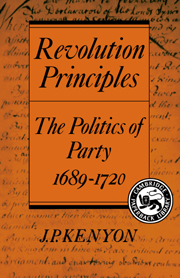Book contents
- Frontmatter
- Contents
- Preface
- Preface to the paperback edition (1990)
- 1 Introduction
- 2 By force or by miracle
- 3 The measure of submission
- 4 This skein of tangled principles
- 5 King Charles's head
- 6 The bloody flag
- 7 Revolution Principles
- 8 Black and odious colours
- 9 The four last years
- 10 That triumphant appellation
- 11 Conclusion
- Appendix
- Abbreviations
- Notes
- Addendum
- Index
10 - That triumphant appellation
The deterioration of Whiggism
Published online by Cambridge University Press: 07 October 2009
- Frontmatter
- Contents
- Preface
- Preface to the paperback edition (1990)
- 1 Introduction
- 2 By force or by miracle
- 3 The measure of submission
- 4 This skein of tangled principles
- 5 King Charles's head
- 6 The bloody flag
- 7 Revolution Principles
- 8 Black and odious colours
- 9 The four last years
- 10 That triumphant appellation
- 11 Conclusion
- Appendix
- Abbreviations
- Notes
- Addendum
- Index
Summary
The accession of George I inaugurated a Whig ascendency of nearly fifty years, but in so doing it drove an even deeper wedge between the Old and the Modern Whigs, and modified the ideology of the Whig ruling classes almost out of recognition.
In his first ministry King George found room for only one leading Tory, the Earl of Nottingham, who was still regarded as a Junto ally. In his controversial proclamation for a new parliament the king called upon the electorate to reject the supporters of the last ministry, with the result that the Whigs secured a majority of 120; and this new parliament, on the report of a Committee of Secrecy headed by Walpole, decided to impeach Oxford for his part in the Treaty of Utrecht and attaint Bolingbroke, who had fled.
Bolingbroke's decision to join the Pretender, followed by the Jacobite Rebellion in Scotland, with muted echoes in England, finally damned the High Church interest as ‘the party of popery and rebellion’. That is not to say that the clergy were entirely silenced, nor that the pulpits returned to sanity on political anniversaries like 30 January, and Walpole for one did not rest until he brought down Bishop Atterbury in 1722; but with the next election not due until 1718, the Pretender repulsed and Louis XIV dead, it was an exploded force. The very fact that the archbishops and bishops felt it prudent to issue a public statement abhorring the Fifteen betrayed the fact that the church's loyalty was in doubt; Atterbury and Smalridge's refusal to sign confirmed it.
- Type
- Chapter
- Information
- Revolution PrinciplesThe Politics of Party 1689–1720, pp. 170 - 199Publisher: Cambridge University PressPrint publication year: 1977

